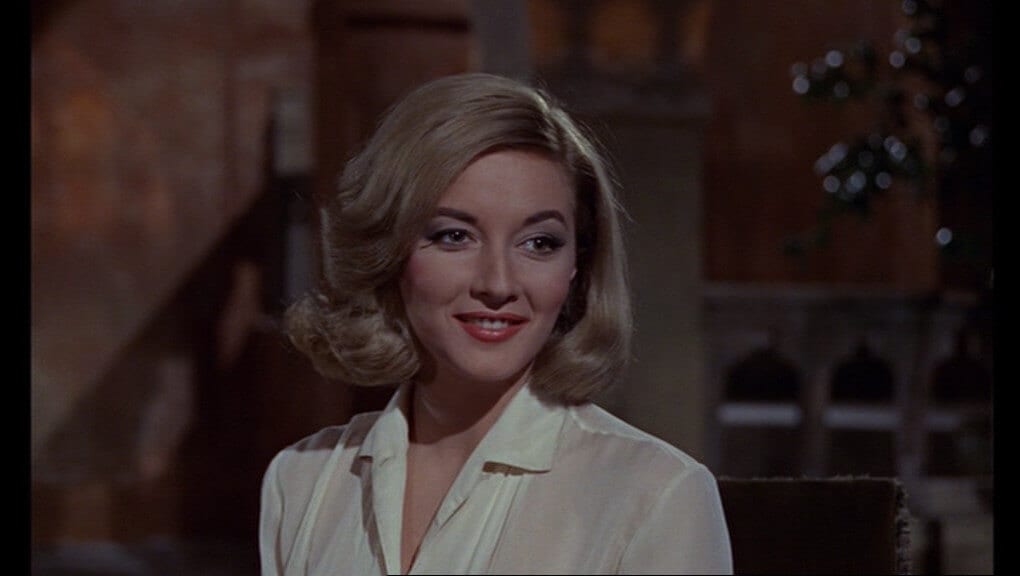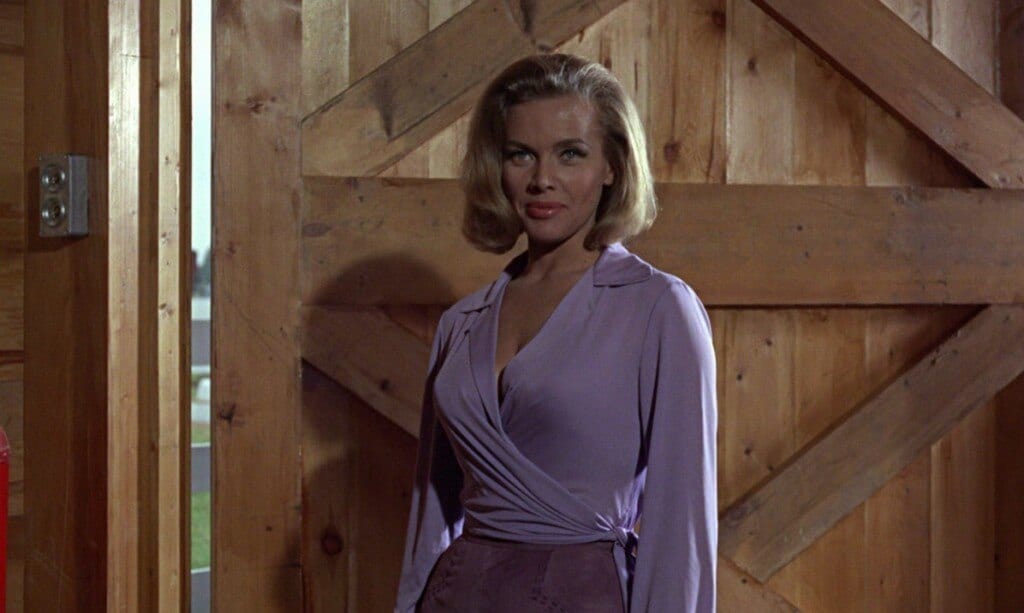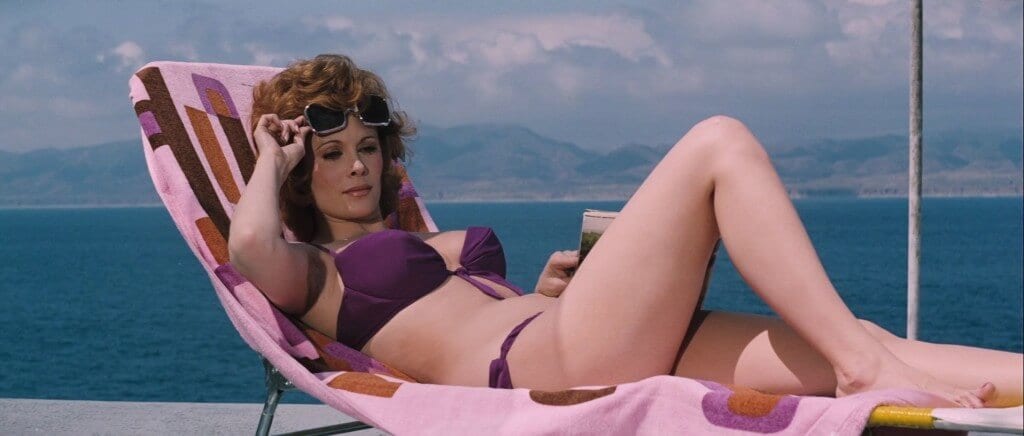Underneath the Mango Tree: The Ladies of Sean Connery’s Bond
“I must be dreaming.”
Allies. Lovers. Betrayers. One of the defining features of any James Bond film is its female characters. Sometimes smart, usually helpful and always beautiful, their importance is undeniable. Sean Connery being the original cinematic Bond, let’s first look at the women from his era.
*Spoilers for the Sean Connery Bond films*

Honey Rider (Ursula Andress), Dr. No
Naturally, we’ll start off with Honey Ryder. A beautiful collector and seller of shells, she is really complex for Bond’s very first on screen love interest.
Alex: I like the fact that she’s not a spy or scientist or anything; she’s just a regular girl going about her business who gets swept up in this adventure. It sells the romanticism and fantasy of Bond’s world, which is important for the first movie in the series.
Virginia: A very good point. Not only is Honey not a spy, she has essentially nothing to do with Dr. No or the happenings of the movie. She’s just a girl in the wrong place and time. Her backstory is really daring, and I like that in the sixties the filmmakers were willing to discuss rape, especially in the form of backstory. Honey is an implicit, understated badass.
A: Definitely. What’s great about making it her backstory is, she doesn’t need Bond to avenge her; she took care of that herself, and she put it behind her. Bond needs to save her from Dr. No, but she’s established as being a strong character beforehand so she’s more than a damsel in distress.
V: Plus, let’s be real. Bond was saving plenty of men from Dr. No as well. I think in a way Honey is preferable to many modern “strong female characters,” in animation, the Bond franchise and in general. She can handle her own life, but she is vulnerable and can’t necessarily do it all on her own. It’s much more believable and human.
A: It seems to be the modern instinct to make the woman an equal to the man in every way, but that really just diminishes her identity. She should be different from Bond, so there’s a contrast of characters. It takes more work to craft an interesting backstory for Honey than to make Wai Lin jump kick a bunch of bad guys, but it creates a much better character.
V: You’re exactly right. Modern women in a lot of cases are written as men with long hair and heels. If a woman is shown doing anything feminine (which a lot of people interpret as weak, which is their own inherent sexism talking), such as crying or being physically overpowered, “feminists” crawl through the woodwork to complain. It’s good to show vulnerability in any character, male or female. It’s realistic, it connects us to them, and it makes them real. Showing that Honey was raped, got over it and overcame the rapist herself is much more powerful to me than if he had attacked her and she immediately killed him. It’s a process. She had to heal and grow.
A: Completely agreed. Physical strength does not equal strength of character. It’s a lazy way to get a pat on the back. And that’s not to say it never works, but it can’t be her sole defining trait.
V: So true. Being a good fighter can add layers to an interesting character, but putting a bow on an empty box does not fill it with meaning.
A: That’s how you get Haywire.
V: So, Honey is amazing. What a great way to start the franchise. Honey is every bit worthy of Bond, but different than him, not his “equal.” What does that mean, anyway? People can’t be equal because people aren’t numbers.
A: Heh. I think so too. You can see on Bond’s face when she’s telling him about herself that he’s fascinated by her. And he recognizes her strength by joking with her about her trauma rather than coddling her. Like when she asks if he thinks she was wrong for killing her rapist and he says, “Well, it wouldn’t do to make a habit of it.”
V: Even Bond himself finds her interesting. What more could a girl want? Love how nonchalant he is about that story, too.

Tatiana Romanova (Daniela Bianchi), From Russia With Love
Tatiana Romanova is a Russian cipher clerk enlisted by her superior, Colonel Rosa Klebb – who, unbeknownst to Tanya, is actually a high-ranking agent of SPECTRE – to lead Bond into a trap by pretending to be in love with him. Along the way, Tanya develops real feelings for Bond, resulting in her being torn between him and her mission.
A: Tatiana Romanova is not one of my very favorites (although From Russia with Love is one of my favorite Bond movies), but I do like her. She’s very much a victim, a pawn of the British, the Russians and SPECTRE.
V: I’ve got to agree there. She may be a Russian agent, but she isn’t proactive like Honey. I don’t think that makes her boring; actually, I think the execution is what makes her boring. I don’t dislike her, but I don’t think she’s anything all that special.
A: Right. She’s just kind of going along for the ride. They don’t play it up much in the movie, but she’s been conditioned to obey her government unquestioningly, so she spends most of the film in her default mode, following orders. It makes the climax, where she has to choose between Rosa Klebb, the symbol of her domineering government (in Soviet Russia, shoe stabs you!) and Bond, the symbol of freedom and individuality, more poignant, but the road to that moment isn’t the most interesting, at least as far as Tanya is concerned.
V: It’s a really fun movie, there just isn’t much to be said with Tanya as the focus. Your point about her conditioning is very interesting though. And great connection, equating Klebb to greater Russia.
A: Thank you. I like her, and I think the movie effectively shows how she’s caught between her orders and wanting to go over to the West with Bond, she’s just not as fun to be around as some of the others.
V: I’m honestly more interested in your observations about her than her actual character in the movie. I’m unsure if that says something bad about her or me. She is one of the loveliest Bond Girls for sure, though.
A: She’s very pretty, though not one of my top picks in that category either (that’s more a testament to the sheer number of beautiful Bond Girls, though). But Daniela Bianchi plays the part well, and you really believe she’s enamored with Bond, so it blurs the line between her real feelings and her mission.
V: It wouldn’t be too hard to “pretend” to be in love with James Bond, if you know what I mean. But yes, I do like the actress. I may be sounding too harsh, and I don’t hate her or anything. She just isn’t one of my favorites either.

Pussy Galore (Honor Blackman), Goldfinger
Pussy Galore, the subject of endless jokes. Initially Auric Goldfinger’s henchwoman, she is seduced by Bond’s wiles and helps him destroy her employer’s plot.
V: Based on what I’ve seen and heard, Pussy is more interesting in the book. She’s certainly a fan favorite, but I feel that they simplified her for the movie, and not necessarily for the better.
A: They downplay the fact that she’s a lesbian, which is a bigger theme in the book. The entire Flying Circus was made up of lesbians, making her a big conquest for Bond. Through her, and Bond’s winning her over, I think they were able to examine that particular male fantasy.
V: I understand the sensitivities of the 1960’s audience, and the movie’s still a classic. That just sounds really interesting, and most people won’t ever know that version.
A: It would’ve been a good theme to play with in the movie, particularly as they focus on the more fantastical elements of the novel. That said, I do like Pussy Galore a lot in the movie. She was the first girl who was really combative with Bond (unless you count Tilly, who had a bigger part in the book).
V: Within the film itself, I find her rather overrated. I find the entire film so, even though it is good. I think Terrence Young’s efforts are ultimately better. I normally love villains who defect, but she’s just not a compelling case to me, probably because Bond practically forces her to change. Blah.
A: I think Terrence Young was the best Bond director. The way he framed his shots was wonderful; he conveyed a lot of information in a single shot, like when Bond is walking along the train platform and Red Grant is following him through the train in the background in From Russia with Love. I somewhat agree about Goldfinger; I love it, but it’s not one of my favorites. Like with Tanya, though, that’s more a testament to how much I love the series than any shortcomings of this film’s.
V: It’s totally subjective, as I see Goldfinger as almost a different type of film from Dr. No and From Russia with Love. It’s basically as campy as the Moore films, but unlike his films, people love it for that. But I don’t like the tone it creates. It feels outlandish to me. I still really like it; it’s by no means bad. I just feel that the film and Pussy go hand in hand: good, but not as good as people say.
A: That’s interesting. It’s definitely more concerned with spectacle than the first two films, but that doesn’t bother me because I like the more outlandish aspects of the series. I like Goldfinger more than Dr. No, but not as much as From Russia with Love. In terms of the women, though, I like Pussy more than Tanya, and… I’m not sure if I prefer her to Honey or not. She’s very different from both of them, which is great because it would get boring otherwise. She’s more of a challenge for Bond, in more ways than one.
V: Speaking of, there is a scene where Bond faces the challenge directly: he forces a kiss on her, and it’s implied that this leads to sex. This could cause some controversy these days, and in fact, I’m surprised more people don’t complain about it. What do you think?
A: Okay, putting on my bullet proof vest. I think the scene works in the context of the film. He is literally forcing himself on her, but its intention, as I see it, is to reflect the power of his masculinity being too much for her to resist. The actions leading up to the kiss/sex show that she is more than capable of fending him off, so when she relents to his advances, forceful though they are, I think it’s of her own volition, not because she feels like she has no choice (and to make it clear, I’m speaking about this particular scene in this particular movie set in this particular fantasy world, not real life).
V: I totally get what you’re saying. Movie logic does not always work in real life, and vice versa. That kiss was forced, but she seemed into it from then on. I find it highly unlikely that anything past that was unwanted. Plus, I must admit, within the fantasy realms of an adventure or fantasy movie, I don’t mind forced kisses so much? I don’t think any real person should do anything to another person against their will. But a certain kind of movie kiss, where it’s forced but ultimately accepted and reciprocated, can be kind of interesting.
A: Yeah, when you’re using a visual medium like film you sometimes use actions and imagery to communicate what people are thinking or feeling. The idea that every single thing has to be taken literally, as it would off screen, kills the artistry. If someone did that in real life it would be wrong, but here it’s done for a specific artistic purpose.
V: Agreed. I really don’t think they intend for us to think Bond is forcing Pussy into some kind of subservience. And as you said, she wouldn’t stand for it. On another note, one thing I really like about her is her visual design. She really dresses like a business lady, and her face is more mature than a lot of Bond women. She really wears her role.
A: Agreed. She’s got a no-nonsense look about her, like she won’t be swept up in romance like Honey or Tanya. She’s very much a woman, as opposed to a girl, if that makes sense, unlike Tanya.
V: Well put.

Domino Derval (Claudine Auger), Thunderball
“My dear, uncooperative Domino,” was Bond getting the exact measure of Thunderball’s leading lady. Domino Derval is the kept woman of the film’s main villain, Emilio Largo, as well as Bond’s lead to the location of two hijacked nuclear weapons. If the previous Bond Girls can be designated as girls or women, Domino seems caught somewhere in between the two, but she’s forced to grow up fast when she learns Largo’s true nature.
V: One thing I like about Domino is that she acknowledges the idea that Bond has been using her. He utilizes women for information all the time, but she isn’t blind to it. She confronts him with it.
A: That’s an excellent point! It’s true; she’s such a complex character. Certain attributes of hers, like her having fun and living in luxury, make her seem childish, but underneath she’s actually very mature. There’s a hint of resigned pessimism that undercuts her frivolity even before she finds out about her brother. Like with Bond; even before she knows he’s a spy, she knows he’s probably not looking for anything serious with her, but she flirts relentlessly with him because she finds him interesting. Yet again, it’s a completely different vibe from anything that’s come before.
V: This isn’t really pertinent but I just want to give the designers a shout out for her bathing suit pictured above? Brilliant. Stunning. And you’re right; she does sort of play with Bond and test him. She’s easily my favorite since Honey. You’ve explained her very well so I don’t really know what to do other than praise her. She’s smart, pretty and a real game changer.
A: She also rescues Bond at the end, instead of him rescuing her, indicating that she’s done letting others take care of her. She’ll get her own revenge, thank you very much. In case my gushing isn’t making it clear, she’s my favorite so far and one of my favorites in the whole series.
V: REVENGE! My favorite. I like that she’s after that, of all things. Contrary to what we learn as kids, I think revenge can be very noble and even healthy. And you’re right, that is quite a turning point. You’ve hit the nail on the head.
A: It also, I think, illuminates something about Bond, specifically his security in his own masculinity. He’s often considered sexist and/or misogynistic, but he has no qualms letting Domino save his life and even treats her like an equal once she’s taken care of Largo. His “You’re glad!?” is an expression of relief that she was there for him. Seriously, James, marry her. Actually, considering what happens to your wives, maybe not so much with the marrying.
V: I don’t think he’s a misogynist, even in the earliest iterations. I think people misunderstand something. Bond uses women for information and pleasure, but that’s not sexist. The information is crucial to his missions, and I don’t feel like explaining the other thing. Seeing this as sexism is very bizarre. If anything he treats men worse overall.
A: He kills ’em! Seriously, though, Bond actually really likes women. It’s why they’re his big weakness. He’d have been better off leaving Tanya behind, but he couldn’t because he cared about her; when he slapped her around it was because he thought she was evil and had his friend killed.
V: Another crucial point: context. Connery’s Bond is the most brutal towards women, but why? When the fate of the world hangs in the balance, the audience is splitting hairs over a man hitting a woman. I can’t roll with that. Context, man.

Kissy Suzuki (Mie Hama) and Aki (Akiko Wakabayashi), You Only Live Twice
Kissy Suzuki is a diver and agent chosen to aid Bond on a mission to investigate some strange goings on surrounding a mysterious island in You Only Live Twice.
Aki is Bond’s partner (and, of course, lover) for the first half of the film, an agent of Tiger Tanaka who acts as a sort of guide for 007 as he navigates Japan.
Although Aki has the more prominent role in the film, Kissy is the girl who is with Bond in the end. We decided to include both girls to be fair and to contrast them.
A: Honestly, I love You Only Live Twice, but I’m not big on Kissy or Aki. Aki is better, as she’s more fun while Kissy is all business, but neither one is a hall-of-famer for me.
V: You Only Live Twice is one of my favorite Bond flicks, but I’ve got to agree there. Both girls are lovely, but I don’t think either one is anything to write home about.
A: Kissy is like a duller version of Pussy Galore, the tough nut to crack. The build-up to her is more interesting than she is.
V: It is notable that these are the first lead Bond girls not to be Caucasian, and so early in the series too.
A: That’s true. I wonder if that’s part of why they’re so underwritten. Maybe the writers thought having girls who weren’t white was enough of a novelty that they didn’t have to spend too much time on their personalities.
V: Good point. I also wonder if they weren’t sure how to portray Japanese women. What we got was fine, but very bare bones. For me, the high point of this movie is Blofeld’s island hideout, complete with fake volcano and riding pods. These designs provided the groundwork for Syndrome’s lair in the Brad Bird/Pixar film The Incredibles, a movie that serves as a love letter to the old Bond films in many ways.
A: The Incredibles did a great job of allowing the Bond films (and this one in particular, as you said) to influence it without letting that aspect overpower the superhero themes. And the volcano base has become the go-to reference for villain lairs.V: It really does; it’s like a fantasy, superhero spy movie. I love that. And you can see why; it is a badass idea. Everybody wants to live in a volcano, right?
A: An air-conditioned one, definitely. But I imagine SPECTRE has some sort of cooling system, at least for Blofeld’s office. I can see his henchmen walking in and feeling relief in the cool air, then suddenly remembering they may be fed to piranha at any moment.
V: Sounds like a good short film idea. Anyway, I like Kissy and Aki for being helpful on Bond’s mission, but I feel that there isn’t much to say about them. They’re serviceable but bland.
A: Exactly. They’re more types than actual characters. Aki is the fun, down-to-earth girl and Kissy is uninterested in sex.
V: They work more as a comparison than one on her own. That’s what they are, different, which is a plus, I suppose; if you’ve got two girls, at least differentiate them.
A: Yeah, and the two girl system is done better in future movies.
V: Agreed. I love a lot of things about this movie, so these two are the aspect that was just alright for me.

Tiffany Case (Jill St. John), Diamonds Are Forever
Tiffany Case is a rung in the smuggling pipeline Bond investigates in Diamonds Are Forever. She’s a tough, street-smart gun moll type who isn’t as tough or smart as she thinks she is, but she’s got a knack for self-preservation.
V: I’ve got to be honest; Tiffany isn’t one of my favorites. I find her kind of grating, in fact. Her best characteristic is her hair, which is fake.
A: She’s not one of my favorites either. Her Chicago gangster lady shtick is laid on so thick she becomes a caricature, and she’s very unduly arrogant. I do, however, like Diamonds Are Forever as a whole more than most people seem to.
V: That movie’s just too odd for me. It doesn’t have a very Bond-ish tone in my perception. I don’t hate it; it’s one of my least favorites, though. Tiffany is part of this, as you say. She hams it up.
A: Big time. She’s one character who was much more interesting in the book. She had a very tragic backstory, similar to Honey’s; only instead of coming through it intact she’s defined by it. Maybe they thought it would feel like a retread if they did it again.
V: Maybe. I think that would be amazing. Different people, in the same circumstance, will react differently. I think showing that in fiction is wonderful.
A: Most of what I like about Tiffany is the reactions she elicits from Bond. Like when he switches the tape that powers the laser aboard Blofeld’s oil rig, then she switches the fake for the real one, and Bond says, “You stupid twit, you put the real one back!” A step back for Bond girl resourcefulness, but funny.
V: That is pretty funny, and sort of plays into how this movie sort of works as a parody. The main girl is usually Bond’s most useful ally, but here it’s almost as if she’s working against him, if inadvertently.
A: I hadn’t thought about that, but you’re right. She messes up a lot, especially at the end. Like when she fires the machine gun, hits no one and falls into the ocean. Her plan to gain Blofeld’s trust and betray him backfires because she’s ultimately too dopey to pull it off.
V: She is similar to Mary Goodnight in The Man with the Golden Gun. I actually like Goodnight and she isn’t so annoying, but they are both ditzy goofballs who mess up a lot.
A: I like Goodnight if only for the gags about her name. In a similar vein, Plenty O’Toole has a lot of the same qualities as Tiffany, but I don’t mind her as much, probably because it works better in a character with a smaller part. Plenty makes a pretty big mistake, but it only puts her in danger, not the whole world.
V: That’s a good point. A bit part has a lot more room to be irritating than a principal character. Tiffany is really annoying because she is the most important woman in the movie and ultimately ends up with Bond. All she really does is smart off, change her stupid wigs and get in Bond’s way. If you take her out entirely or replace her, it wouldn’t change the plot all that much.
A: It’s too bad, because Bond and a character like Tiffany could’ve been an interesting pairing. The contrast between a noir type dame and a British spy lends itself to lots of neat personality clashes. If only she were a stronger character.
V: Yes, exactly. If she wasn’t such a stereotype and had an interesting set of characteristics this could have been one of the better Bond romances. At times this one almost feels like it’s self-aware and poking fun at the spy genre.
A: Yeah, and she’s a good example of it. You can have an outlandish character without making them silly. And again, I really like this movie overall, but it gets very goofy at times (like Bond’s hidden mouse trap).
V: I feel kind of guilty whenever talking about this movie or Goldfinger. I don’t hate them at all; I just prefer the tone of movies like Thunderball. And Goldfinger is still better than Diamonds Are Forever. Pussy is also better than Tiffany.
A: I think there’s a difference between outlandish and silly. Bond’s souped-up cars are outlandish, but they make sense in this world. A mouse trap in your jacket is just silly. Likewise, Pussy Galore is an outlandish character, but she makes sense in Bond’s world, while Tiffany is silly.
V: Excellent point. And that makes the difference between being playful and fantastic, and approaching the territory of genre satire.
***
V: Tiffany is a caricature and one of the least enjoyable Bond women. I think out of Connery’s companions, she earns bottom slot for me. My favorites are a tie between Honey Ryder and Domino. I love Honey for her understated but powerful backstory. Domino is actually a rather complex character, and she calls Bond out on squeezing her for information. They’re both beautiful, smart and useful to Bond’s missions.
A: My favorite is Domino, because I find her the most interesting and I like her character arc a lot; Pussy Galore would be second for the same reasons. My least favorite is Kissy Suzuki because she’s so dull. Tiffany is annoying, but I prefer that to boring, and at least some of her pratfalls are funny.
V: That’s a good point. I just have a really short fuse for annoying characters. You’re right, though, she is more entertaining than Kissy. I guess it’s just a question of what’s worse, memorably bad or forgettably bland.
A: Pretty much. I can’t fault anyone for putting Tiffany at the bottom of their list. Overall, though, I think Connery had a good stable of leading ladies. They’re (mostly) fun, beautiful, and a lot better-rounded than they’re given credit for being.
V: Yes, overall I like them very much. They laid the groundwork for a lasting legacy.
A: Just like Sir Sean himself.
Come back next time for an inspection of Tracy di Vincenzo Bond, the first cinematic love of Agent 007. Same Bat time, same Bat channel.







